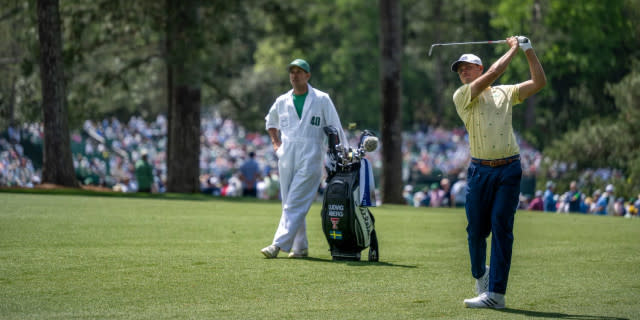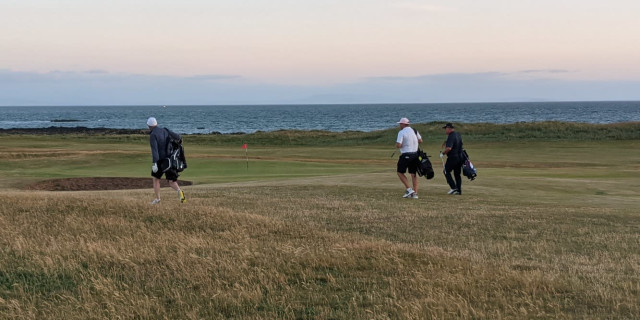
What Are Golf Press Conferences Really Like
You have all seen sportsmen being interviewed in the immediate aftermath of a victory or a near-miss. And then there are those dreadful interviews with football managers and goal scorers where you are left with the overwhelming impression that they would rather be doing anything else but know they have contractual obligations.
Of course, when you stick a microphone in somebody’s face seconds after they have just produced a life-changing performance the chances are that you are going to get somebody fighting back tears as the enormity of what they have just achieved sinks in. You will ask get some wonderful quotes.
We saw it in Abu Dhabi recently when Paul Waring beat Europe’s best players for a life-changing win, and we saw it again in Bermuda after Rafael Campos won the Butterfield Championship after missing 13 of his previous 15 cuts.
Featured Content
There is then a trophy presentation before the chief protagonists gather their thoughts and have to face the media. I have attended many of these media press conferences in my time as a journalist - and not just in golf.
By and large, the questions that are asked are pretty anodyne - and so are the answers.

(Image Credit: Kevin Diss Photography)
In 1997 I covered the World Snooker Championship for The Sunday Times.
On the Saturday night I watched Stephen Hendry fall over the finishing line in a hard-fought semi-final against Alain Robidoux.
The standout moment for me actually had nothing to do with the play we witnessed. At a crucial stage in the final session, somebody in the crowd tried to open a packet of sweets. In the process, he or she dropped a drink can and the entire contents of the sweet packet on the floor. To say it was noisy is an understatement. Hendry was over a shot at the time but such was his focus that he potted the ball and then moved to the next one. He was the only person in the Crucible Theatre who hadn’t heard the commotion. It particularly impressed me because this was the time when Colin Montgomerie was in his prime and was being distracted by the flapping wings of butterflies.
It was a dreadful match and Hendry had played like a drain. I still don’t know how he managed to win. He was facing Ken Doherty in the final, to be played over the following two days. And there wasn’t slightest doubt in my mind that Doherty was going to win.
I sat in on the press conference and couldn’t quite believe some of the questions that were being aimed at Hendry. Nobody acknowledged that he had played poorly. It was all about him winning yet another world title. And then I realised why - these were journalists who regularly covered snooker and they did not want to antagonise the Scot because they knew they would need to talk to him again.
I had no such concerns. I raised my hand.
"Derek Clements, The Sunday Times. Stephen, you clearly struggled to beat Alain Robidoux and I am sure you would agree that you were nowhere near your best tonight. What will you be working on to raise your game to beat Ken?"
Hendry stared back at me, pure hatred in his eyes, and replied: "I am playing great snooker. I don’t have to do anything."
With that, the press conference was immediately called to an end and Hendry stormed out. Clive Everton, a respected snooker journalist and broadcaster, approached me and congratulated me for asking the question nobody else had dared to.
Oh, and Hendry duly lost to Doherty.
And then there was the press conference after Cameron Smith won The Open at St Andrews in 2022. The rumour mill was in overdrive with reports that the Australian was about to join LIV Golf.
When he faced the media, Smith only wanted to talk about winning the Claret Jug. No surprise there.
But everybody in the room was waiting for the first LIV question. Would anybody dare to ask it? You bet…
"Apologies for having to bring this up in these circumstances, but your name continues to be mentioned, has been mentioned to me this week about LIV Golf. What’s your position? Are you interested? Is there any truth to suggestions that you might be signing?"
Smith’s response? "I just won the British Open, and you’re asking about that, I think that’s pretty not that good."
That’s pretty not that good? It has to be said that Smith is not the most articulate of individuals but even he might have come up with something better were he given another chance.
And, of course, he hadn’t answered the question so this is what followed:
"I appreciate that, but the question is still there. Are you interested at all? Is there any truth in that?"
Smith said: "I don’t know, mate. My team around me worries about all that stuff. I’m here to win golf tournaments."
Anybody who believes that Smith had not already signed on the dotted line is pretty naive - and it wasn’t long before his move to LIV was confirmed.
The worst press conferences tend to be with losers. As journalists we are taught never to ask closed questions. If you give somebody who has just lost a tournament the opportunity to sit there and say "Yes" or "No" then you can bet your last pound that they will take it. Losers just want to get out of there as quickly as possible and be alone with their thoughts. They don’t need or want some journalist reminding them of the three-foot putt they just missed.
Sometimes you need to be inventive. If somebody clearly doesn’t want to talk, journalists will ask a question this way: "Andy, would you say that you are struggling with your driver and that your short game is nowhere near where you want it to be."
As long as Andy says "yes", that quote then becomes, Andy said: "I am struggling with my driver and my short game is nowhere near where I want it to be."
The best press conferences are when the subject opens up voluntarily.
I loved Justin Lower’s press conference after the third round of the WWT Championship. He led the tournament and would go to bed that night dreaming of his maiden PGA Tour success. But he didn’t really want to talk about that - instead he was focused on the tour’s plans to reduce field sizes in 2026.
He initially spoke about what winning would mean to him but then came this: "I hate all the changes they're making, that's a whole other subject I could rant about for like an hour. It seems like anytime I do something good they make a change." Quotes like this are gold-dust because they are so unexpected.
Some golfers are the stuff of dreams when it comes to press conferences. With the likes of Bryson DeChambeau and Phil Mickelson you essentially only have to ask one question and they will take care of the rest.
Mickelson’s performance in front of the media after the 2014 Ryder Cup at Gleneagles is one that I will never forget.
Paul McGinley’s European team handed out a lesson to an American team led by Tom Watson.
Nobody would argue with the fact that Watson made some mistakes but at the end of the day it came down to his players - and they failed to perform.
Watson is a living legend and one of the most-loved men in golf. If you are going to criticise anybody you don’t pick on Watson - and you certainly don’t do it when he is sharing the stage with you.
As is the way of things at the Ryder Cup, the losing team face the media together, alongside their captain. And they were feeling pretty sorry for themselves.
This question was asked:
"Anyone that was on the team at Valhalla, can you put your finger on what worked in 2008 and what hasn't worked since?"
Without hesitation, Mickelson was first to answer. And it was pretty brutal.
He said: "There were two things that allow us to play our best I think that Paul Azinger [the captain in 2008] did, and one was he got everybody invested in the process. He got everybody invested in who they were going to play with, who the picks were going to be, who was going to be in their pod, who - when they would play, and they had a great leader for each pod. In my case, we had Ray Floyd, and we hung out together and we were all invested in each other's play. We were invested in picking Hunter Mahan that week; Anthony Kim and myself and Justin were in a pod, and we were involved on having Hunter be our guy to fill our pod. So we were invested in the process.
"And the other thing that Paul did really well was he had a great game plan for us, you know, how we were going to go about doing this. How we were going to go about playing together; golf ball, format, what we were going to do, if so-and-so is playing well, if so-and-so is not playing well, we had a real game plan. Those two things helped us bring out our best golf. And I think that, you know, we all do the best that we can and we're all trying our hardest, and I'm just looking back at what gave us the most success. Because we use that same process in the Presidents Cup and we do really well. Unfortunately, we have strayed from a winning formula in 2008 for the last three Ryder Cups, and we need to consider maybe getting back to that formula that helped us play our best. Nobody here was involved in any decision."
It was an attack on Watson and it gave journalists their headlines for the following day’s papers. And when all is said and done, that is exactly what journalists are looking for from press conferences.
Related Content

Be part of the action with a selection of unique golf tournament experiences, from playing in a pro-am with the stars to watching the action at golf’s most illustrious events. Whether it’s the Masters or The Open, The Ryder Cup or WM Phoenix Open, build your own bespoke package with the experts at Golfbreaks.com.
Tags: PGA Tour LIV Golf european tour dp world tour









